语法专题串讲-形容词和副词
- 格式:ppt
- 大小:473.00 KB
- 文档页数:32
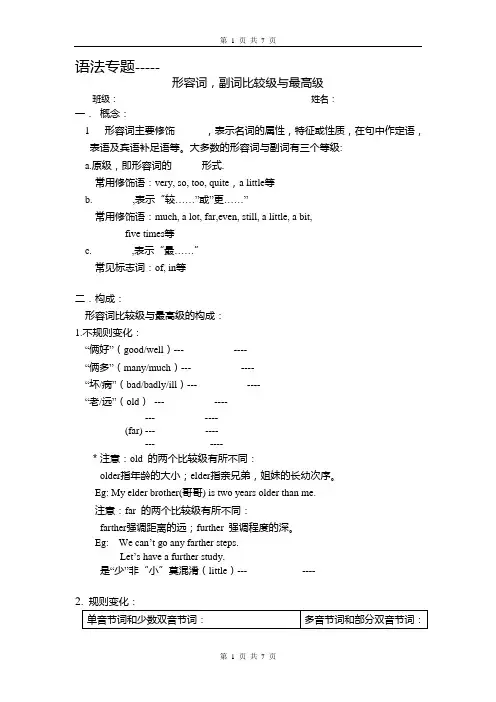
语法专题-----形容词,副词比较级与最高级班级:_________ 姓名:__________一.概念:1 形容词主要修饰______,表示名词的属性,特征或性质,在句中作定语,表语及宾语补足语等。
大多数的形容词与副词有三个等级:a.原级,即形容词的______形式.常用修饰语:very, so, too, quite,a little等b.________,表示“较……”或”更……”常用修饰语:much, a lot, far,even, still, a little, a bit,five times等c.________,表示“最……”常见标志词:of, in等二.构成:形容词比较级与最高级的构成:1.不规则变化:“俩好”(good/well)---__________----_________“俩多”(many/much)---__________----_________“坏/病”(bad/badly/ill)---__________----_________“老/远”(old)---__________----_________---__________----_________(far) ---__________----_________---___________----_________*注意:old 的两个比较级有所不同:older指年龄的大小;elder指亲兄弟,姐妹的长幼次序。
Eg: My elder brother(哥哥) is two years older than me.注意:far 的两个比较级有所不同:farther强调距离的远;further 强调程度的深。
Eg: We can’t go any farther steps.Let’s have a further study.是“少”非“小”莫混淆(little)---___________----_________2.规则变化:单音节词和少数双音节词:多音节词和部分双音节词:a.以不发音的e 结尾的只加-r/-stb.以辅音字母加y结尾的双音节词,先变y为i,再加-er/estc.以重读闭音节结尾且末尾只有一个辅音字母的,需双写再加-er/estd.一般-er /este.在原级前加more / most (详见八年级上册P93)三.用法1. 原级:a.常用于句型:主+ be+ adj. (……是……的);…as…as (和...... 一样);…not so(as)…as… (不及……) 中Eg: The coat is expensive.The coat is as expensive as that one.2. 比较级:a.常用于句型:主+be+ 形比+ (than+ 被比较对象)Eg: Tara’s hair is a little longer (than Paul’s).b.特殊用法:①Which/ Who is + 比较级,A or B? 表示“在两个当中,哪个/谁更……”Eg: Which is easier, English or Chinese?②比较级and 比较级。
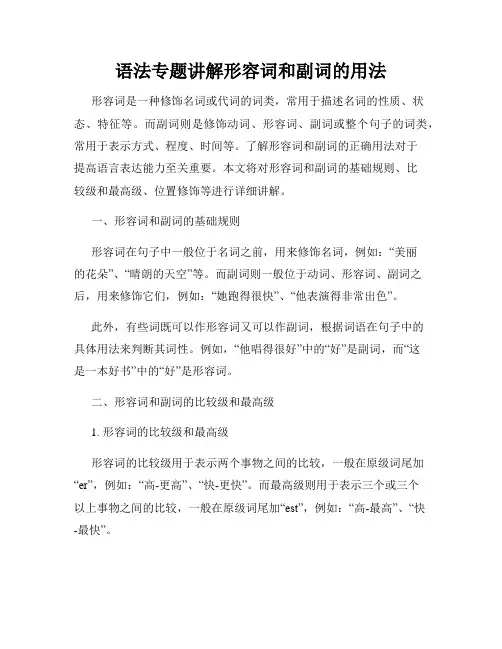
语法专题讲解形容词和副词的用法形容词是一种修饰名词或代词的词类,常用于描述名词的性质、状态、特征等。
而副词则是修饰动词、形容词、副词或整个句子的词类,常用于表示方式、程度、时间等。
了解形容词和副词的正确用法对于提高语言表达能力至关重要。
本文将对形容词和副词的基础规则、比较级和最高级、位置修饰等进行详细讲解。
一、形容词和副词的基础规则形容词在句子中一般位于名词之前,用来修饰名词,例如:“美丽的花朵”、“晴朗的天空”等。
而副词则一般位于动词、形容词、副词之后,用来修饰它们,例如:“她跑得很快”、“他表演得非常出色”。
此外,有些词既可以作形容词又可以作副词,根据词语在句子中的具体用法来判断其词性。
例如,“他唱得很好”中的“好”是副词,而“这是一本好书”中的“好”是形容词。
二、形容词和副词的比较级和最高级1. 形容词的比较级和最高级形容词的比较级用于表示两个事物之间的比较,一般在原级词尾加“er”,例如:“高-更高”、“快-更快”。
而最高级则用于表示三个或三个以上事物之间的比较,一般在原级词尾加“est”,例如:“高-最高”、“快-最快”。
如果原级词以“e”结尾,则只需在词尾加上“r”或“st”,例如:“large- larger- largest”。
而对于以一个辅音字母结尾的重读闭音节词,则要双写辅音字母,并加上“er”或“est”,例如:“big- bigger- biggest”。
2. 副词的比较级和最高级副词的比较级和最高级的构成与形容词的变化规则相似,一般在原级词尾加“er”或“est”,例如:“quickly- quicker- quickest”。
然而,有一些词的比较级和最高级是不规则的,例如:“well- better- best”、“badly- worse- worst”。
需要特别注意的是,有些词没有比较级或最高级,只能用原级形式表达。
例如,“unique”、“perfect”等词。
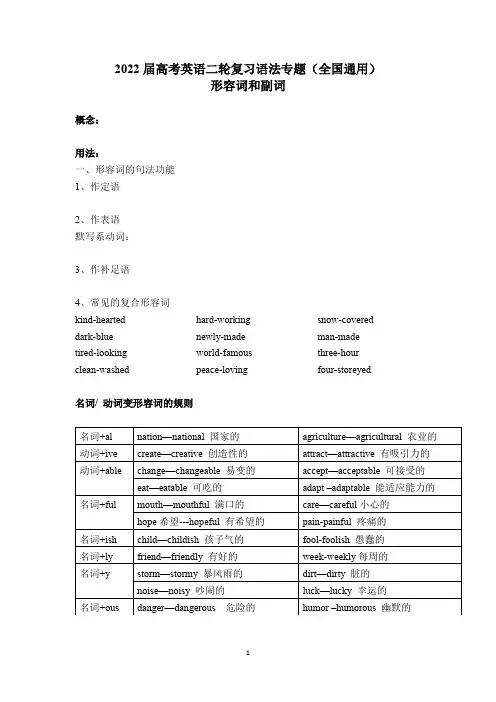
2022届高考英语二轮复习语法专题(全国通用)形容词和副词概念:用法:一、形容词的句法功能1、作定语2、作表语默写系动词:3、作补足语4、常见的复合形容词kind-hearted dark-blue tired-looking clean-washed hard-workingnewly-madeworld-famouspeace-lovingsnow-coveredman-madethree-hourfour-storeyed名词/ 动词变形容词的规则名词+al nation—national 国家的agriculture—agricultural 农业的动词+ive create—creative 创造性的attract—attractive 有吸引力的动词+able change—changeable 易变的accept—acceptable 可接受的eat—eatable 可吃的adapt –adaptable 能适应能力的名词+ful mouth—mouthful 满口的care—careful小心的hope希望---hopeful 有希望的pain-painful 疼痛的名词+ish child—childish 孩子气的fool-foolish 愚蠢的名词+ly friend—friendly 有好的week-weekly每周的名词+y storm—stormy 暴风雨的dirt—dirty 脏的noise—noisy 吵闹的luck—lucky 幸运的名词+ous danger—dangerous 危险的humor –humorous 幽默的二、副词的句法功能作状语三、易混淆的词1、hard—hardly例:He works hard. He hardly smokes.2、late—lately —later — latest例:She always come back late.Lately, I have had trouble sleeping.She came back 3 days later.I got the latest album of Jay.3、-ly结尾的形容词friendly , lovely, lonely, lively, deadly(致命的),elderly (年龄较大的),yearly, monthly, daily, weekly,be likely to (可能做某事)四、常考的几组副词用法:1、though意为:2、besides意为:3、however意为4、therefore意为:5、instead 意为:6、ago和beforeA、ago一般用于B、beforeadj. 变adv.的规则slow—slowly 缓慢地exact—exactly 精确地natural—naturally 自然地obvious—obviously 显然地happy-happily angry—angrilynoisy--noisilyterrible—terribly 糟糕地gentle --gently 温柔地possible—possibly 可能地simple – simply 简单地comfortable ---comfortably 舒适地probable—probably 可能地fortunate—fortunately 幸运地polite –politely 礼貌地rude—rudely 粗鲁地complete—completely 完全地特殊:true—truly真实地energetic –energetically 有活力地basic—basically 基本上automatic—automatically 自动地scientific—scientifically 科学地原级比较级最高级第一类tall taller tallest第二类largenice largernicerlargestnicest第三类easyhappy easierhappiereasiesthappiest第四类(辅元辅)hotthinhotterthinnerhottestthinnest第五类importantquickly more importantmore quicklymost importantmost quickly第六类不规则good/wellbad/badly/illoldmuch/manybetterworseolder/eldermorebestworstoldest/eldestmost一、形容词/ 副词原级用法1、as..as.. 和..一样(as+形容词/ 副词原级+as) , not as..as.. 不如...2、as+形容词+a/an+可数名词单数+as二、形容词/ 副词比较级用法 1、比较级+than ,表示:更….2、比较级+and+比较级, 表示:越来越….3、the+比较级, the+比较级 表示:越…越…4、比较级前可以用_________________________________等词来修饰,表示程度。
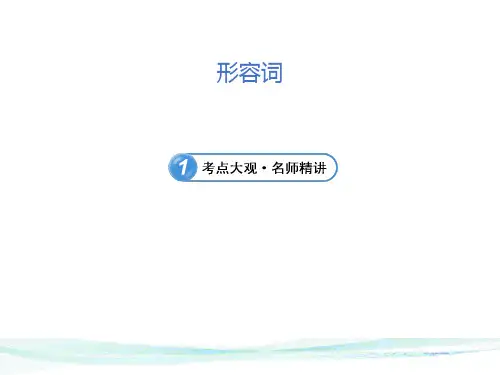
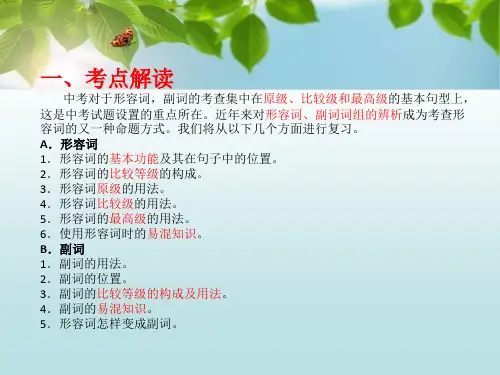
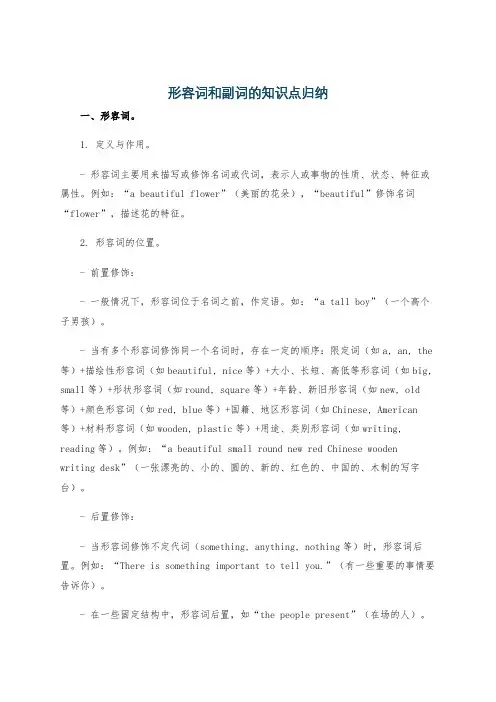
形容词和副词的知识点归纳一、形容词。
1. 定义与作用。
- 形容词主要用来描写或修饰名词或代词,表示人或事物的性质、状态、特征或属性。
例如:“a beautiful flower”(美丽的花朵),“beautiful”修饰名词“flower”,描述花的特征。
2. 形容词的位置。
- 前置修饰:- 一般情况下,形容词位于名词之前,作定语。
如:“a tall boy”(一个高个子男孩)。
- 当有多个形容词修饰同一个名词时,存在一定的顺序:限定词(如a, an, the 等)+描绘性形容词(如beautiful, nice等)+大小、长短、高低等形容词(如big, small等)+形状形容词(如round, square等)+年龄、新旧形容词(如new, old 等)+颜色形容词(如red, blue等)+国籍、地区形容词(如Chinese, American 等)+材料形容词(如wooden, plastic等)+用途、类别形容词(如writing, reading等)。
例如:“a beautiful small round new red Chinese woodenwriting desk”(一张漂亮的、小的、圆的、新的、红色的、中国的、木制的写字台)。
- 后置修饰:- 当形容词修饰不定代词(something, anything, nothing等)时,形容词后置。
例如:“There is something important to tell you.”(有一些重要的事情要告诉你)。
- 在一些固定结构中,形容词后置,如“the people present”(在场的人)。
3. 形容词的比较级和最高级。
- 规则变化:- 一般在词尾加 -er(比较级)和 -est(最高级)。
如:tall - taller - tallest。
- 以不发音的e结尾的单词,加 -r和 -st。
如:nice - nicer - nicest。
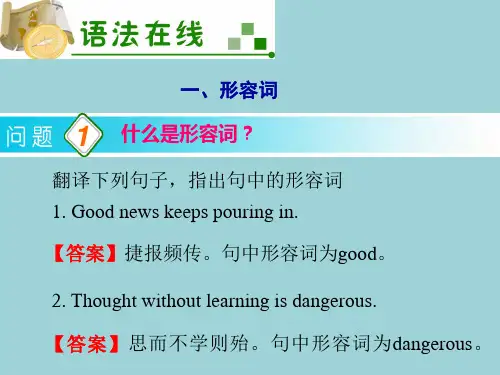

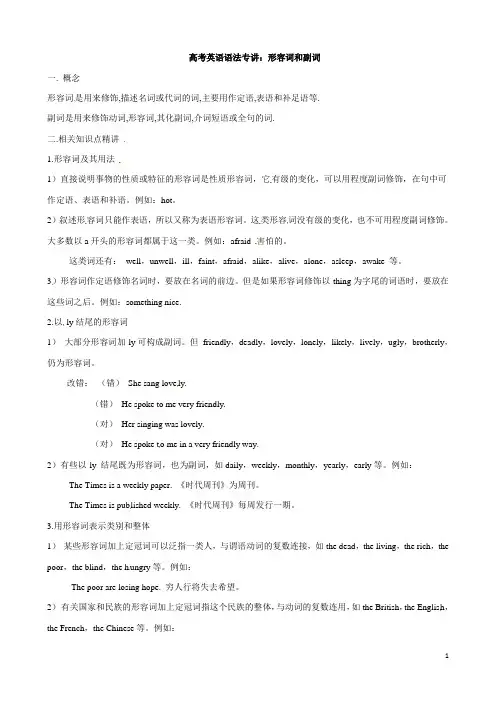
高考英语语法专讲:形容词和副词一. 概念形容词是用来修饰,描述名词或代词的词,主要用作定语,表语和补足语等.副词是用来修饰动词,形容词,其化副词,介词短语或全句的词.二.相关知识点精讲1.形容词及其用法1)直接说明事物的性质或特征的形容词是性质形容词,它有级的变化,可以用程度副词修饰,在句中可作定语、表语和补语。
例如:hot。
2)叙述形容词只能作表语,所以又称为表语形容词。
这类形容词没有级的变化,也不可用程度副词修饰。
大多数以a开头的形容词都属于这一类。
例如:afraid 害怕的。
这类词还有:well,unwell,ill,faint,afraid,alike,alive,alone,asleep,awake 等。
3)形容词作定语修饰名词时,要放在名词的前边。
但是如果形容词修饰以-thing为字尾的词语时,要放在这些词之后。
例如:something nice.2.以-ly结尾的形容词1)大部分形容词加-ly可构成副词。
但friendly,deadly,lovely,lonely,likely,lively,ugly,brotherly,仍为形容词。
改错:(错)She sang love ly.(错)He spoke to me very friendly.(对)Her singing was lovely.(对)He spoke t o me in a very friendly way.2)有些以-ly 结尾既为形容词,也为副词,如daily,weekly,monthly,yearly,early等。
例如:The Times is a weekly paper. 《时代周刊》为周刊。
The Times is published weekly. 《时代周刊》每周发行一期。
3.用形容词表示类别和整体1)某些形容词加上定冠词可以泛指一类人,与谓语动词的复数连接,如the dead,the living,the rich,the poor,the blind,the h ungry等。

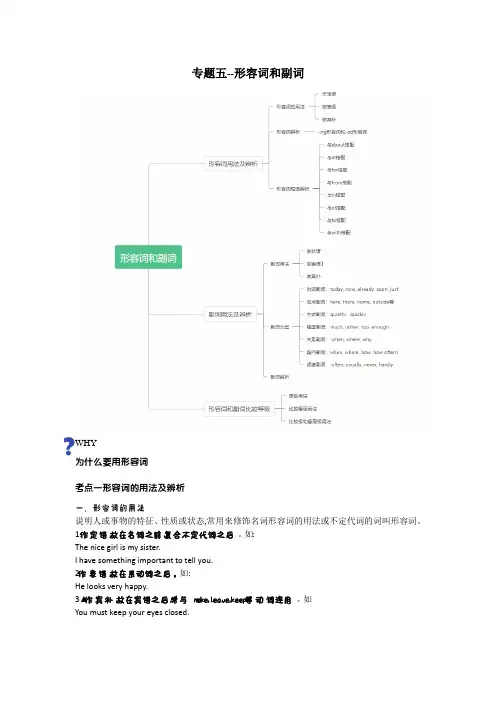
专题五--形容词和副词WHY为什么要用形容词考点一形容词的用法及辨析一、形容词的用法说明人或事物的特征、性质或状态,常用来修饰名词形容词的用法或不定代词的词叫形容词。
1.作定语,放在名词之前,复合不定代词之后。
如:The nice girl is my sister.I have something important to tell you.2作表语,放在系动词之后。
如:He looks very happy.3▲作宾补,放在宾语之后,常与m a ke, leave,keep等动词连用。
如You must keep your eyes closed.二、形容词辨析1.-ing 形容词和-ed形容词2.区别是什么:▲-ing用来表示一个人,一个物或者一种情景的特征▲-ed用来形容人的感觉或者情感比较:My girlfriend is bored.My girlfriend is boring.-ing形容词修饰物-ed形容词修饰物例句Surprising Surprised This is a surprising story.I am surprised at the news.interesting interested I read an interesting book last week.Are you interested in watching football games?exciting Excited Lucy told me that she had an exciting journy this summer holiday.I’m excited about the traveling.pleasing pleased This is a pleasing trip.Mr. Smith is pleased with our performance.frightening frightened We were told a frightening story last night.we are frightened of the ghost.moving moved Titanic is a moving film.All the people were deeply moved by the love of Jack and Rose. tiring tired It’s a long tiring day.I’m too tired to go out again.fascinating Fascinated What a fascinating voice!Many boys are fascinated by computer games.Amusing Amused He likes to surround himself with amusing people.We were all amused at his stories.Disappointing Disappointed If you do, you’ll only be disappointed.It was disappointing to lose the game.Worrying Worried We are worried about you.Her sisuation is worring.3.多个形容词修饰同一个名词时的顺序-描绘形容词—大小(长短高低)形容词—形状形容词—年龄(新旧)形容词—颜色形容词—国籍形容词—材料形容词—用途(类别)形容词—名词I bought a nice(好看的) small(小小的) round(圆形的) new(新的) yellow(黄色的) French (法国产的) oak(橡木做的) writing desk.太长了.....我们常用的是这样的↓↓:an old Chinese stone bridgesome beautiful little red flowers但如果确实要用这么多定语来修饰这个writing desk的话可以怎么做呢?如何辨别哪些是形容词呢:通常来讲如下后缀结尾的词为形容词:-al, -ial, -ical:national, essential, criticial,special, social,central, general-able, -ible:vuable, edible,unable, suitable, reasonable,possible, responsible-an, -ian:American, Roman,Australian-full:meaninful, faithful, beautiful-ic:energetic,public,academic, fantastic, dramatic-ical:biological, chemical, logical,medical,musical, physical,-ive:active,creative, commutative,decisive, effective-ish:foolish, selfish, childish,girlish, yellowish-less:meaningless, endless, useless,helpless,colorless-y:easy, ready,dry, cloudy, sunny, rainy,snowy-ous, -ose: various, famous,curious,dangerous-ant, -ent:important, brriliant,dominant, distant,diffrent, present, recent-ile:4.形容词短语辨析在英语中有很多形容词后需要加特定的介词构成形容词短语,常见的有: (1)与a bout搭配be careful about对……小心be sure about对…有把握be crazy about对…热衷be curious about对……好奇be worried about对…担忧be anxious about对感到焦虑be sorry about对…感到遗憾be strict about sth.对某事要求严格(2)与a t搭配be amused at以为乐be annoyed at对…恼怒be surprised at对感到惊奇be angry at对生气be good at在…方面擅长的用(与期词(3)与f or搭配be famous for因…而著名get ready for做好准备be sorry for感到抱歉be fit/unfit for适合/不适合be good for对有好处be bad for对…有坏处be suitable for适合be thirsty for渴望(4)与f rom搭配be absent from缺席be different from与不同be separated from和…分离开(5)与in搭配be interested in对……感兴趣be weak in在...方面薄弱be different in在…方面不同be successful in在…方面成功(6)与搭配be afraid of害怕be fond of喜欢be proud of为感到自豪be tired of对…感到厌倦be full of充满be careful of对…小心be short of…短缺be ashamed of对…感到羞愧(7)与t o搭配be close to接近,靠近be good to对…好be kind to对和蔼be rude to对……粗鲁be polite to对……有礼貌be useful to对……有用be related to与……有关be similar to与……相似(8)与w ith搭配be angry with对……生气be careful with小心be busy with忙于be filled with充满be related to与有be similar to与相似(8)与w ith搭配be angry with对……气be careful with小心be busy with忙于be filled with充满be satisfied with对……感到满意be pleased with对……感到满意be patient with对……有耐心be strict with sb.对某人要求严格WHY什么是副词?为什么要使用副词?Even after one year of lessons, Luke plays the piano badly.He's always in a rush. I don't understand why he walks so quicklyMichael happily took the assistant job. He had been looking for a position all summer.以上表示how,怎么样,以什么方式I couldn’t find the car keys inside your purse.The lift is moving up.-Where is Lucy? I haven’t seen for a while.-She is/went abroad.Wendy threw the garbage out, but the flies would not leave.以上表示where,在哪里I didn’t go to the museum yesteday.Charlie, can you wait me for a second? I’ll be back soon.I have already finished the project.The recently found Wallace was so lost that he just wandered aimlessly in circles.以上表示when,在什么时候。
高考语法专题之---形容词和副词一、考点归纳考点一:形容词、副词的基本用法1. 形容词主要作定语、表语、补足语、状语。
2. 副词主要作状语,用于修饰动词、形容词、副词或整个句子。
3.形容词(短语)作状语,说明主语的状态、性质、特征等。
4.有些副词置于句首,可修饰整个句子,作评注性状语。
5.副词修饰形容词的特殊词序:so, as, how, too+形容词+a(n)+单数可数名词He returned home, safe and sound.Happily for her, her stepmother was kind to her.It is just as fierce a competition among countries to host the Olympics as to win Olympic medal. 考点二:形容词副词的比较级和最高级1.表倍数的句型2.比较等级常见句型考点三:形容词、副词的辨析附:常见表否定意义的前缀:1.dis-(加在动词前)disagree, disappear, disapprove, disconnect(失联)2.in- (加在形容词、名词前)incomplete , incorrect, indirect, incapable(无能的), incredible(难以置信的), inaccurate(不准确的),inability(无能),incapacity(无能)3.im-(加在以字母m/p/b开头的词汇前)impossible, impolite, improper, immoral(不道德的),impatient, immature(不成熟的)4.il- illegal, illogical5.ir-(加在以字母r开头的词汇前)irregular, irrelevant, irresponsible ,irresistible(无法抗拒的,非常诱人的), irrational(不合理的,失去理性的)6.un-(加在名词、形容词、副词前)unhappy, unfair, unsatisfied, unfinished, undoubted,7.mis-(加在动词、名词前) misunderstand, misjudge, mislead, misfortune8.anti-(加在名词、形容词前) anti-social anti-Japanese anti-war考点四:习惯搭配形容词与名词的习惯搭配;副词与动词的习惯搭配,如:discrimination+ against, attitude+ to/towards, impact+ on/ upon, effect + on/ upon;seriously ill(病得厉害), slightly/seriously injured(轻伤、重伤), painfully thin(瘦得可怜), struggle financially(生活拮据)二、演练提升(一)根据提示写出所缺单词的正确形式1.Fried foods ___________(agree)with me. Therefore, I seldom go to KFC.2.I was supposed to arrive at the airport on time. _____________(fortune), Iwas held up by the heavy traffic jam.3.She still suffers considerable ______________(comfort)from her injury.4.They believe in ________________(violent),simple living and little comfprt with the modernworld.5.I’m sorry to tell you that there is a slight ___________(accuracy)in this design.6.Therefore, when they become older, they are ________ (able)to do any other kind of work.7.Very early the next morning, amazingly, we got completely satisfied in a totally___________(expect)way.8.They create wildly ___________(usual)baskets in different shapes and colors.9.The parcel was returned to the sender because the directions were __________(correct)10.The word “kick”sometimes is used to describe complaint or some kind of_________________(satisfy)11.Loneliness in a gloomy raining day may be ____________(bear) to him.12.I won’t do the purchase because the price of the dress is ________(reason)(二)用所给词的正确形式填空:1The aim of education is to teach young people to think for themselves and not follow others _______________(blind)2What was so____________(impress) about Bob was that he came first in the marathon bare-footed.3Hardly had she finished her words when Albert said __________(sharp), “Don’t be so mean”.4The naughty boy entered the classroom _______________(caution), fearing that his teacher would blame him.5Basketball coaches waste no time in searching for _______________ (promise) young players of great potential for better performance in the coming season.6Unemployment in Japan is likely to remain high in 2014,and __________(possible) for the next few years.7Next to Biology, I like Physics __________.8___________(initial),she opposed the plan but later she changed her mind.9They were doing ___________(exact) the opposite to what I had told them.10The more expensive articles are not_________ better(necessary).11The output of this year is 3 times _______ of 2012.12The output of this year is 3times _________ it was in 2012.(三)1. History is the best teacher. It _records the development path of each country .A. apparentlyB. conventionallyC. faithfullyD. eventually2. The boy managed to climb out of the car, __________unhurt.A. regularlyB. extremelyC. frequentlyD. apparently3. Although money is important, money _____won’t make a happy life.A. apartB. aloneC. asideD. alike4. I make $2000 a week, 60 surely won’t make_________difference to me.A. that a bigB. a that bigC. big a thatD. that big a5. Students who study _______can have more satisfaction, be healthier and more effective.A. appproximatelyB. flexiblyC. accuratelyD. extremely高三年级(上)英语一轮复习Book 1 错题回顾Module 1 & 2易错单词1. 被…分成________________2. 宁愿我昨天就见你了虚拟语气_____________3. 对….严厉____________4. n.理解;领悟___________ vt.____________5. n.记述;描述___________ vt. 描述___________6. vt.给人以深刻印象________ n.印象________ adj.给人以深刻印象的____________7. n总结;概述._______ vt.总结;概述__________8. vt.承认;准许进入_______n. __________9. adj. 放松的___________ adj.令人轻松的_________&vi(使)轻松;放松________n.放松;轻松易错短语1. 对…热情____________________2. 对某人友好________________3. 一对;一双_______________4. 取得进步_____________________5. 对…耐心的________________6. 对学习的态度_________________7. 按照某人的指示说明___________________________Module 3--4易错单词1.n.仪式__________2. 电车__________3. n.旅程_____________4.海港_____________5. cassette n. _________6. n.城郊;郊区______7.adj.吉祥的幸,运的___________ 8. n职业___________9.n. 令人讨厌的人/事___________10.adj.迷人的;吸引人的_______11.n.运动场;体育__________ 12.被遗弃的____________ 13. n.幼儿园____14.海岸__________ 15.vi.(________过去式)射杀16. n. 区域;行政区____17.运动场____________18.adj.失业的;没有工作的__________易错短语1. 在……方面做得好_______________2. put up ______________________3.忍受__________________4. 许多的,大量的_______________________5. 负担的起做某事____________________6. get away from _____________7. 通过一项法律_____________________8. 是……的缩写/简称_________。
语法专题-形容词与副词一、形容词和副词的构成1.合成形容词的构成单个形容词的构成比较复杂,考生要熟记常见的形容词的后缀(如:-able, -al, -en ,-ful, -ish, -ous -y, -ly等等)。
而合成形容词是有规律可循的。
规则例词规则例词形容词+名词-ed kind-hearted 名词+形容词world-famous 形容词+形容词dark-blue 名词+现在分词peace-loving形容词+现在分词ordinary-looking 名词+过去分词snow-covered形容词(副词)+形容词wide-awake 名词+(普通)名词English-language 副词+现在分词hard-working 数词+名词-ed three-egged 副词+过去分词newly-built 数词+名词twenty-year2.副词的构成规则例词在形容词后加―ly‖entirely curiously exactly fortunately attentively immediately将形容词的词尾―le‖变―ly‖comfortable—comfortably gentle—gently possible—possibly probable—probably词尾―y‖变―i+ly‖busy—busily easy—easily heavy—heavily angry—angrilyhungry—hungrily lucky—luckily happy—happily特殊词true—truly二、形容词和副词的功能1.形容词的功能功能举例定语He has never seen such a more interesting film.他从来没有看过这么有趣的电影。
表语I’m fine, but tired.我身体很好,但很累。
★(1)连系动词+adj. 连系动词:①be动词②感官动词(look; smell; feel; touch; taste; sound)③“变化”型:(become; turn; go; get…)④―保持‖型:(keep /remain/stay…)★(2)It’s+adj.+(for/of sb.)+to do sth. ★(3)so+adj.+that句子“如此…以至…”★(4)too+adj.+to do sth.★(5)形容词/副词+enough The weather i s getti ng warmer and warmer.天气变得越来越暖和。
形容词和副词形容词可用于作表语、定语、宾语补足语、状语等;副词也可以作表语、定语、宾语补足语、状语等。
一、形容词作定语时的位置大部分形容词作定语时放在所修饰的名词前面, 如a red bus, a beautiful park, cold weather等,但实际运用时须注意以下情况。
1.当多个的形容词修饰一个名词时应该注意形容词的一般排列顺序。
“限定词+一般描绘性形容词+表示大小、长短、高低的形容词+表示形状的形容词+表示年龄、新旧的形容词+表示颜色的形容词+表示国籍、地区、出处的形容词+表示物质、材料的形容词+表示用途、类别的形容词+被修饰的名词”例如:his beautiful small round old brown French wooden writing table当然,在实际运用中用如此多的形容词修饰一个名词并不多见。
2.形容词修饰everything, something, anything, nothing时, 只能放在其后面。
如:Some farmers saw something strange in the sky.I’ve got something important to say.There is nothing interesting at all.3.else只能修饰疑问代词who, whom, whose, what和不定代词something, anything, nothing, somebody,someone, anybody, anyone和nobody, no one.而且只能放在其后。
如:Is there anything else you want to say?What else do you want?else与上述疑问代词和不定代词构成所有格时, 只能在else后加's, 而不能在疑问代词或不定代词后加's. 如说someone else's, 而不能说* someone’s else。
高中英语语法复习专题讲解-形容词副词一、考点聚焦1、形容词、副词的作用与位置形容词是用来修饰名词的,常被放在名词前作定语,或放在系动词后面作表语。
而副词则用来修饰形容词、动词,其他副词或者句子,一般位于形容词之前,动词之后或句子之首。
以下属几种特殊情况,须牢记;(1)形容词短语作定语,定语后置。
a language difficult to master, a leaning tower about 180 feet high(2)表语形容词(afraid、alike、alone、asleep、awake、alive等)作定语,定语后置。
如a man alive。
有些表身体健康状况的形容词如well、faint、ill只作表语。
sick既可作表语又可作定语,ill如作定语意为“bad”。
(3)用作定语,修饰由不定代词one、no、any、some和every构成的复合词如anything、something等时,通常后置。
如:I have something important to tell you.(4)else常用作疑问代词和不定代词的后置定语。
(5)enough、nearby修饰名词前置或后置,程度副词一般位于形容词、副词前面,enough修饰形容词、副词时,必须后置。
(6)几个副词并列作状语时,其顺序较灵活,但一般是:方式→地点→时间。
如:We had a good time together outdoors last Sunday.(7)频度副词如often、always、usually等在be动词后,行为动词前。
(8)副词作定语,定语后置。
如:The person there is waiting for you.(9)几个并列的形容词作定语,其语序通常为:限定语(The、A)+ 描绘性形容词+ size(大小)+ shape (形状)+ age(年龄、时间)+ color(颜色)+ origin(国籍、来源)+ material(材料)+ purpose(目的)+ 名词。
语法专题复习:形容词、副词教案课型:复习课教学目的:通过“精讲精炼,点拨疑难”的教学方法来复习和巩固形容词、副词的原级、比较级、最高级等的基本用法,练习和巩固含有形容词、副词的常用句式以及复习一些特殊的形容词和副词的用法,使学生了解高考试题对该部分的考查方法和设题规律。
力求使学生在复习和巩固的基础知识的同时,提高学生的语言运用能力和应试技巧。
教学思路:教学原则是“精讲精炼,点拨疑难”。
通过让学生做练习,达到复习和巩固知识的目的。
老师在提问学生和解答学生疑难的过程中,为学生指点迷津,梳理知识,扩展知识,提升应试能力。
教学方式:使用多媒体课件辅助教学。
基本使用全英授课,必要时,使用汉语解释。
教学过程:一、通过做练习复习关于形容词、副词的一些基础知识;二、分析高考试题对形容词、副词的考查方法,让学生熟悉该考点,了解高考试题的特点和命题规律。
通过纠正学生的错误,扩展和提升学生的已有知识,归纳解题的技巧,使学生达到触类旁通的目的。
三、给学生提出关于形容词、副词的备考建议。
以下是教学环节的具体设计:Teaching plan for Grammar Revision:Adjectives and AdverbsStep 1 Leading inPlay the video of Sunshine on my shoulders to arouse the students’ interest.Do you like the song? Yes. And so do I. Not only do I like the tune, but also the lyric. Let’s read part of the words together:Sunshine on my shoulders makes me happySunshine in my eyes can make me crySunshine on the water looks so lovelySunshine almost always makes me highWho can say something about the song or the singer?The song was sung by John Denver, An American country music singer. Though it is very old, it is still popular today. The singer was famous worldwide. His voice was very pleasant. We can see him playing the guitar skilfully. Frankly speaking, I like him very much. What about you?Now you see, when we describe someone or something, we have to use adjectives and adverbs. Today we are going to review the usages of adjectives and adverbs. We’ll find out the differences between them, then analyze how they are tested the College Examination papers. And lastly, discuss what we shall do to prepare for the coming exams.Step 2 Review and Practice:一、高考必备基础知识Part 1: The basic knowledge about adjectives and adverbs.Please complete the following sentences with the help of the Chinese given in the blanks.(一)、形容词和副词的基本用法比较:First, Lets’ c ompare the differences between adjectives and adverbs.①In ______(最近) years,the earth has got warmer.②They paid for the two coffees __________(各自).③Have I made my meaning ________(清楚)?④I can’t see it very _________(清楚) without glasses.⑤At midnight I lay in bed, ____________(非常清醒).⑥Earthquakes are _____________(很难) to predict.⑦___________(显然),he was completely wrong.⑧Money ______ (单单) can’t bring us happiness.Key: ①recent ②separately③clear ④clearly ⑤wide awake⑥extremely/very hard/difficult ⑦Clearly/Obviously/ Apparently⑧aloneThe red words are adjectives while the blue words are adverbs. Look at these examples and find out how they are differently used in the sentences: we can see that adjectives are usually used in front of nouns, after link verbs like be, become, get, seem, sound, and after objects. Sometimes they appear in front of a sentence with a comma, or at the end of a sentence, used as adverbials. By contrast, adverbs usually appear in front of adjectives, adverbs and after an action verb. Some adverbs appear in front of a sentence, modifying the whole sentence, or expressing the speaker’s opinions. Their functions are different: adjectives are used as attributive, predicative, complement and adverbial, but adverbs are mainly used as adverbials to modify adjectives, adverbs, verbs or the whole sentence. Occasionally, a small number of adverbs can be used after nouns as attributive.you can use them correctly. Correct the mistakes you find in the following sentences.①Lang Lang plays the piano wonderful.→wonderfully②Mark is serious ill today. →seriously③Mr. Jones is a typically Englishman. →typical④Come close. I have a secret to share with you.√⑤Let’s hurry. I hate arriving lately.→late⑥Someone left the back door wide open.√=fully open⑦We can jump really high on the moon.√⑧The gentleman spoke to me friendly. →in a friendly way/gently⑨They say the new movie is pretty good. √=fairly/considerably⑩ Be quiet. The baby is sound asleep. √ =fast asleep=deeply asleep(二)、形容词和副词的比较级的用法Secondly, let’s review the comparative forms of adjectives and adverbs.1、比较级的构成Complete the sentences with the help of Chinese given in each blank.①Tokyo is more organized in traffic, but London is _________ (便宜) Tokyo in price.②--How are you getting on with your classmates?--________(好多了). I’ve got to know most of them.Keys: ①cheaper than/lower than /more inexpensive than/more economical/less expensive than/not as/so expensive as ②Far better/Much better.It is clear that we use the comparatives forms to compare two different objects. One-syllable adjectives or adverbs form their comparatives by adding suffixes –er to the end of the positive form/ the base word. But if the word has two or more syllables, we usually put more in front of it.2. 复习倍数的表达法:Zhengzhou University is___________________ (几倍大)our school.Key: several times as large as/ several times the size of/ several times larger than总结英语中倍数的表示法:①倍数as large(形容词副词原级) as+比较对象②倍数the size(抽象名词)of +比较对象③倍数larger(形容词副词比较级)than+比较对象④倍数as much+不可数名词as+比较对象⑤倍数as many+可数名词as +比较对象3. 列出形容词和副词比较级前的词语much, a little, a bit,slightly, a lot, even, still, far, a great/good deal, rather, any, no,not 和分数(one third/fourth)、百分数(35%, 18%)倍数(twice, three times)和具体的数量(two years, one inch)等。